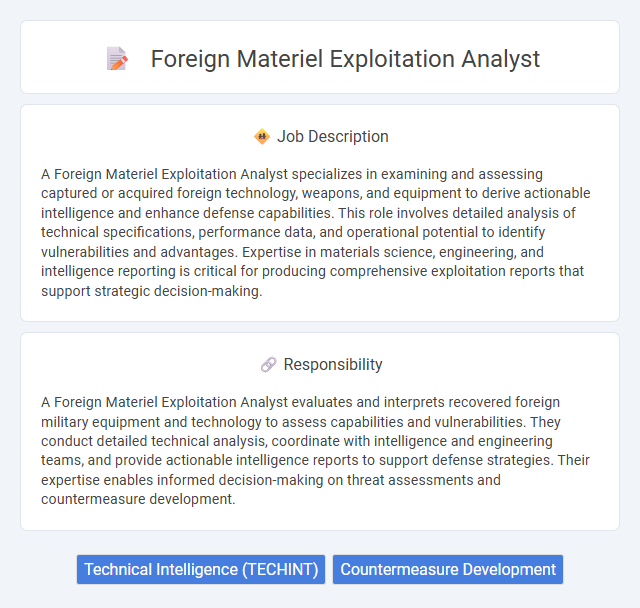
A Foreign Materiel Exploitation Analyst specializes in examining and assessing captured or acquired foreign technology, weapons, and equipment to derive actionable intelligence and enhance defense capabilities. This role involves detailed analysis of technical specifications, performance data, and operational potential to identify vulnerabilities and advantages. Expertise in materials science, engineering, and intelligence reporting is critical for producing comprehensive exploitation reports that support strategic decision-making.
Candidates with strong analytical skills, attention to detail, and an interest in military technology are likely to be suitable for a Foreign Materiel Exploitation Analyst role. People who thrive under pressure, demonstrate persistence in problem-solving, and possess the ability to work with classified information may have a higher probability of success. Those lacking technical aptitude or discomfort with sensitive material might find this position challenging.
Qualification
A Foreign Materiel Exploitation Analyst requires expertise in reverse engineering, threat assessment, and technical intelligence analysis related to foreign military equipment and technology. Candidates must possess strong analytical skills, familiarity with defense systems, and proficiency in interpreting technical data from a variety of sources. Advanced degrees in engineering, military science, or intelligence, along with experience in security clearance environments, are essential qualifications.
Responsibility
A Foreign Materiel Exploitation Analyst evaluates and interprets recovered foreign military equipment and technology to assess capabilities and vulnerabilities. They conduct detailed technical analysis, coordinate with intelligence and engineering teams, and provide actionable intelligence reports to support defense strategies. Their expertise enables informed decision-making on threat assessments and countermeasure development.
Benefit
Foreign Materiel Exploitation Analyst positions likely offer significant benefits such as gaining expertise in analyzing foreign technologies, which can enhance career prospects in intelligence and defense sectors. The role probably provides access to cutting-edge tools and classified information, fostering a highly specialized skill set. Employees may also benefit from secure government employment with competitive salaries and comprehensive support programs.
Challenge
Foreign Materiel Exploitation Analysts likely face the challenge of accurately interpreting complex and unfamiliar technologies under tight deadlines. The role probably demands keen analytical skills to assess foreign equipment while navigating security and intelligence constraints. This job may require adaptability to rapidly evolving technological environments and unpredictable operational scenarios.
Career Advancement
A Foreign Materiel Exploitation Analyst analyzes captured or recovered enemy equipment to provide critical intelligence that enhances military capabilities and technological advancements. Career advancement in this field often leads to senior roles in defense intelligence, research and development projects, or strategic operations planning, supported by specialized training and security clearances. Mastery of technical analysis, language skills, and collaboration with defense agencies significantly boosts promotion prospects and career growth opportunities.
Key Terms
Technical Intelligence (TECHINT)
Foreign Materiel Exploitation Analysts specialize in dissecting captured or recovered foreign military equipment to derive actionable Technical Intelligence (TECHINT). They evaluate weapon systems, sensors, and communication devices to identify technological capabilities and vulnerabilities, enabling strategic military and defense advancements. Their expertise supports development of countermeasures and enhances threat assessment accuracy by leveraging detailed reverse engineering and data analysis.
Countermeasure Development
Foreign Materiel Exploitation Analysts specialize in dissecting enemy technology and equipment to extract actionable intelligence for countermeasure development. They conduct detailed reverse engineering and forensic analysis to identify vulnerabilities in adversarial systems, enabling the creation of advanced defensive tools and strategies. Their expertise supports military and security agencies in enhancing threat detection, electronic warfare, and protective measures against emerging technologies.
 kuljobs.com
kuljobs.com